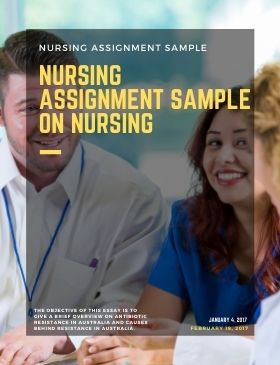
You can download the sample Nursing case study on Indigenous Australian Cultural Practices with the following question for free at the end of this page. For further assistance with Nursing Assignment help, please check our offerings in Nursing assignment solutions. Our subject-matter experts provide online assignment help to Nursing students from across the world and deliver plagiarism free solution with a free Turnitin report with every solution.
(AssignmentEssayHelp does not recommend anyone to use this sample as their own work.)
Nursing Assignment Questions
Analyze the causes of homelessness in Australia and the problem this creates for Australian society. Examine the causes of the spread of drug resistant bacteria .Discuss some of the possible solutions to managing this problem in Australian hospitals.
Some issues you might like to discuss can include, but not limited to:
1.Super bugs and antibiotic resistance
2.Environmental factors
3.Antibiotics policy
4.Health care in Australia
Nursing Assignment Solution
Antibiotic resistance term is self-explanatory that is ability of bacteria to survive against a particular antibiotic or a range of antibiotics which were previously used to kill the bacteria. This occurs when bacteria changes their system in such a way, or evolve by which the antibiotic killing efficiency reduces (Tzu, 2015). The antibiotic can be a chemical agent, a small molecule or a recombinant of both. Antibiotic resistance is emerging as the greatest public health agenda in 21st century. The solution of yester year has now become a problem (Health, 2014). As per CDC, almost every bacterium has evolved with time by increasing their resistance against antibiotics. The spreading can lead to dangerous consequences, as no antibiotic currently available in the market can cure (Fair & Tor, 2014). Thus, the health department has little or less control over the situation that has made antibiotic resistance as top most concern of every health body. The objective of this essay is to give a brief overview on antibiotic resistance in Australia and causes behind resistance in Australia.
WHAT RESEARCH SAYS??
MUCIPROCIN AND ANTIBIOTIC RESISTANCE
While there are many ways through which antibiotic resistance can spread, it also differs within country. Irrespective of countries or geographical location, one common cause of antibiotic resistance is its uncontrolled use over the years. Each and every domain of health science is fighting with these superbugs as cases of resistance are increasing every day. In dermatology domain, resistance has been reported for Staphylococci, Propionibacterium acnes, and certain report says streptococci. But recently, the resistance increase by Streptococcus aereus indicate towards muciprocin a bacteriostatic. Post its introduction in 1986, by 1991 it was made available in the market as over the counter product. Extreme use and use without any significant knowledge led to muciprocin resistance in Streptococcus aereus while dealing wound management. The resistance peaked during 1997, which was standing at 17% during that period. Increase use in Western Australia, also led to increased resistance. Therefore, to counter act such increasing resistance the status of muciprocin was increased to mandatory prescribed medicine from OTC that led to downfall in its resistance by Streptococcus aereus.
Therefore, public must be educated on antibiotics prior to use at the same time, health care department and Pharma companies must evaluate anti-septic's efficacy against antibiotics in wound management that can possibly reduce the spread of resistance (Moodabe & Bryant, 2000).
ANTIBIOTIC STEWARDSHIP AGAINST RESISTANCE
Recently Australian health department has adopted many interesting strategies to fight with methicillin-resistant-Staphylococcus aereus. Since Australia has the highest users of antibiotic across Globe, it needs to be used judiciously in order to reduce its spread. A recently adopted program i.e. Antibiotic Stewardship has shown promise in fighting resistance. Antibiotic stewardship program involves strategies that aim to reduce resistance, toxicity and cost of excessive antibiotics use. Stewardship in this program can be obtained by prescribing the best required antibiotic regimen, dose adjustment, administration and duration of medication.
The three main strategies which were already in action is restriction of antibiotic use, enhancing knowledge of patient and prescriber and taking feedback post prescription. This strategy helped in reduction of antibiotic resistance and prescription in between 2002 and 2005. Although, NPS Medicine Wise survey elucidates four out of five Australians prefer to have a prescription for ear, nose and throat infection, there was a reduction in prescription. To have its effect at community level antibiotic stewardship program was taken through community education based on guidelines adopted by NPS in 2012 (McKenzie, Rawlins, & Mar Del, 2013).
IS EXCESSIVE ANTI-BIOTIC USE IS ONLY REASON?
While public perception of antibiotic resistance is linked with excessive use of antibiotics, there are methods by which antibiotic resistance can occur without any direct involvement of patient or prescriber. River water and reclaimed effluent water is used for agricultural activities. A recent study was carried out to find the antibiotic resistance genes in waters of Werribee River Basin, Australia. The study employed molecular biology techniques to estimate the presence of antibiotic resistance genes in both the waters by PCR assay. The study reported only 4 samples from collected 54 samples of river water to be positive for antibiotic resistance, but out of 11 collected reclaimed water samples 6 samples tested positive for methicillin, sulphonamide, gentamicin and vancomycin. However, no relationship was observed between taken parameters for study and presence of antibiotic resistance genes.
(Some parts of the solution has been blurred due to privacy protection policy)


 WhatsApp Us
WhatsApp Us